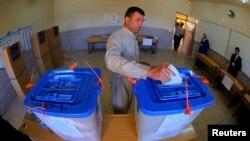Iraqi election officials are counting ballots Thursday after the country's first general elections since U.S. troops withdrew in 2011.
More than 20 million people were eligible to take part in Wednesday's vote to select members of Iraq's 328-seat parliament.
Despite the massive police turnout, and a vehicle ban in Baghdad, election-related violence left at least 12 dead across the country.
Security officials reported roadside bombs and suicide blasts targeting voters and polling stations in the northern and western parts of the country.
Despite the violence, many Iraqis remained determined to vote, some for what they hoped would be a new government that would bring change for future generations.
The United Nations Security Council welcomed Wednesday's vote, and called on Iraq's leaders to form a government as quickly as possible that represents the will of the Iraqi people.
Others came to support Prime Minister Nouri al-Maliki, who is seeking a third term in his post. Voter turnout was reported high in Baghdad and Basra, but relatively low in Sunni regions.
Maliki, who urged Iraqis to turn out in large numbers, was confident of a victory.
"I wish to see a huge turnout. God willing we will celebrate the success of the election and the defeat the terrorism and those who bet on election postponement," said Maliki.
Maliki's Shi'ite-based State of Law alliance is expected take the most seats, but to fall short of a majority.
The voting was boycotted by Sunni insurgents. Anti-Maliki factions accuse him of monopolizing power and deepening the country's divisions.
More than 20 million people were eligible to take part in Wednesday's vote to select members of Iraq's 328-seat parliament.
Despite the massive police turnout, and a vehicle ban in Baghdad, election-related violence left at least 12 dead across the country.
Security officials reported roadside bombs and suicide blasts targeting voters and polling stations in the northern and western parts of the country.
Despite the violence, many Iraqis remained determined to vote, some for what they hoped would be a new government that would bring change for future generations.
The United Nations Security Council welcomed Wednesday's vote, and called on Iraq's leaders to form a government as quickly as possible that represents the will of the Iraqi people.
Others came to support Prime Minister Nouri al-Maliki, who is seeking a third term in his post. Voter turnout was reported high in Baghdad and Basra, but relatively low in Sunni regions.
Maliki, who urged Iraqis to turn out in large numbers, was confident of a victory.
"I wish to see a huge turnout. God willing we will celebrate the success of the election and the defeat the terrorism and those who bet on election postponement," said Maliki.
Maliki's Shi'ite-based State of Law alliance is expected take the most seats, but to fall short of a majority.
The voting was boycotted by Sunni insurgents. Anti-Maliki factions accuse him of monopolizing power and deepening the country's divisions.





